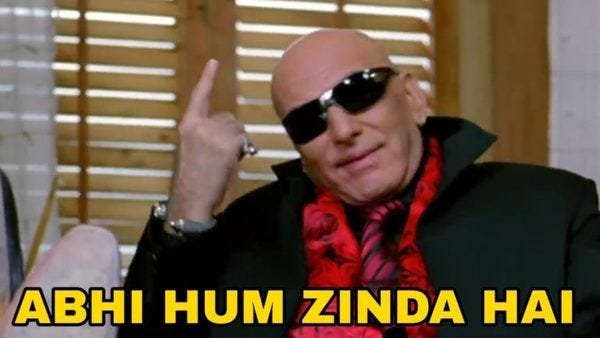#6: 'Trads', 'raitas', and the emerging developments in Hindutva ecosystem
Abhi hum zinda hain...
Not that anyone was losing their sleep over it, but just to feel important, I would like to begin this edition by apologising for my unplanned and unannounced break. As I missed my internal deadline for one edition, inertia kicked in and I began sliding down the slippery slope of postponing by one more day at a time.
Anyway, I am back and hope to remain consistent.
Trads and raitas: emerging developments in Hindutva ecosystem
Recently, the terms ‘trad’ and ‘raita’ have suddenly become ubiquitous in many Twitter discussions about Hindutva. If you have trailed Hindutva trolls, there is a good chance that you would have discovered an ecosystem of the community who believe that Modi is too ‘moderate’ and not aggressive enough. Ironically, they accuse Modi of – wait for it – “minority appeasement”, the very issue over which he took on the Congress party. They are ‘trads’ and they call other ‘mainstream’ Hindutva supporters ‘raitas’.
For a deeper understanding of the trad ecosystem, I suggest this explainer by Alishan Jafri and Naomi Barton. (TW: genocide, casteism, etc.)
While reading about this, I wondered if there is an equivalence of this in Hindutva history. I realise that while these terminologies is new, the fundamental tension between subgroups within Hindutva is fairly old. The compromises made in politics to appeal to a broader audience has always been a matter of contention within the Hindutva movement.
The project of Hindu Nationalism started as a bottom-up social movement with a little interest in politics. As Vinay Sitapati argues in his book The BJP Before Modi, it was only after they faced the wrath of the Indian state under Nehru that Hindu nationalists began seeing politics as a necessary means to protection from the state machinery.
Subgroups within Hindu nationalism have often been disappointed with the political leadership of Hindu nationalism for not being aggressive enough. In the recent past, almost every successive Hindu Nationalist leader has gained more popularity and support by lending voice to the more extreme subgroups – eventually to be replaced by another leader voicing extremer subgroups. Who knows if Yogi Adityanath would seem ‘moderate’ in future? This is scary.
All is not lost. An important caveat about ‘trads’ is that we do not know how widespread they are within the Hindutva movement. As of now, it appears that they are mostly upper castes and are vociferously targetting OBCs and Dalits as well. Note that the genius of the Hindutva movement was that it was more inclusive (than the average Hindu) on caste and more exclusive on religion. In other words, they united ‘the Hindus’ against ‘other’ (mainly Muslims). If trads continue down this casteist path, this may end up creating tensions within Hindutva along caste lines.
I do not recall where, but in the context of some discussion over the seemingly insurmountable dominance of BJP, Raghu Sanjaylal Jaitley had a fascinating take. He argued that most of these populist movements rise by claiming some kind of victimhood in the opposition to the ‘other’. Now, when they become a dominant force, their grievances against the traditional ‘other’ (in this case mainly Muslims) becomes less and less credible. Eventually, they start looking for ‘the other’ within, and end up degenerating and disintegrating.
In any case, even if things get better eventually, we should ask ourselves: what did it cost?
Recommendations
The Seen and the Unseen (Episode 259): The Loneliness of the Indian Woman. This is one of the all-time best episodes. I strongly recommend reading the book first!
“The Wire’s TekFog investigation: A futile search for evidence” by Samarth Bansal. A fantastic analysis of the caveats in The Wire’s latest well-intentioned) investigative report.
Pratap Bhanu Mehta’s latest interview with The Wire on the rising authoritarianism and communalism in India and the abdication by courts.
Adam Przeworski’s understanding of the value and the essence of democracy, in 350 words.
Everything on Samdish Bhatia’s new Youtube Channel, UNFILTERED by Samdish. His interviews with serious politicians are so fun and lighthearted, while he somehow also gets them to open up on very serious issues.
